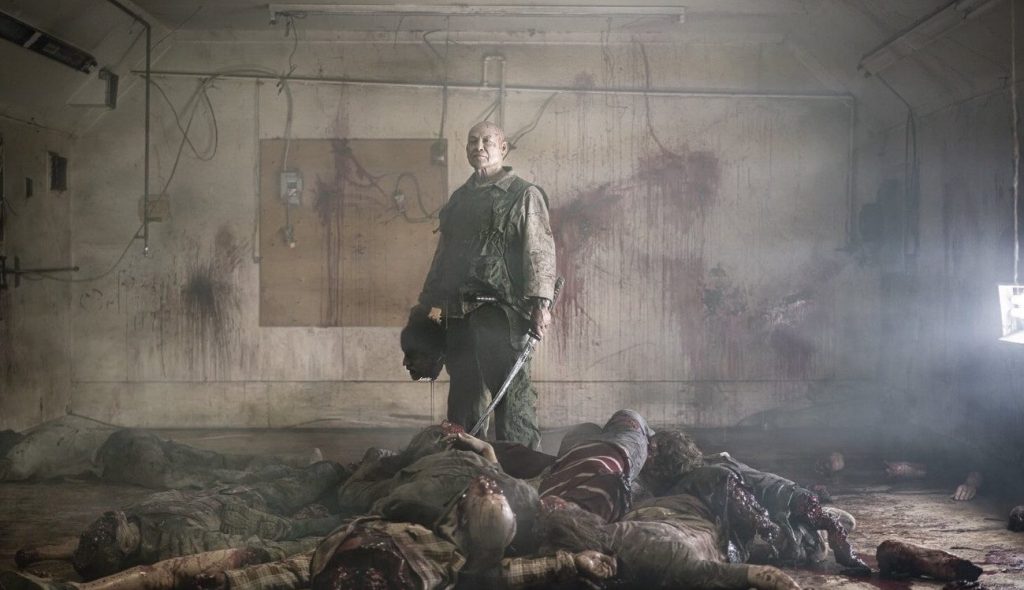Who doesn’t enjoy the warm fuzzy feeling you get from watching a feel-good movie?
Unless your driver’s license says The Grinch on it, moviegoers love to be uplifted and inspired by great films. When life gets you down, losing oneself in the worlds of Amélie and My Neighbor Totoro are sure-fire pick-me-ups.
As we self-quarantine and social distance, we can all use a few great pick-me-ups. But an interesting thing began to happen as people try to ride-out COVID-19. People are turning to doomsday films like Contagion, I Am Legend, and Mad Max: Fury Road as a form of comfort. It’s a strange phenomenon indeed.

To find out why, the Canadian Academy turned to writer/director extraordinaire Jeff Barnaby – a man who knows a thing or two about creating a doomsday film. His latest picture, the scintillating zombie horror film Blood Quantum, features a brilliant conceit. The story takes place in a world where a viral outbreak has decimated the population, while an Indigenous community remains immune.
Blood Quantum is as creepy and over-the-top violent as you want an R-rated zombie flick to be. Most importantly, the film’s themes draw attention to the putrid legacy of colonialism and how our modern-day “do-no-harm” society is built on a foundation of pain and trauma. The story offers a lot to chew on (and not in the flesh-eating zombie way). Barnaby is clearly a man who puts a lot of thought into building his dystopic world. So, who better to talk to about the movie business, pandemics, and the appeal of a good apocalypse flick?
RELEASING A FEATURE FILM DURING A QUARANTINE
The entertainment industry was already in a state of flux before COVID-19 knocked it completely off its axis. Only a small percentage of films released today even receive a theatrical run. The vast majority go straight to VOD and streaming services. Blood Quantum was lined up for a theatrical run this spring, and Barnaby was set to join an increasingly elite club of filmmakers. But with theatres shut down indefinitely, the launch window shifted its focus to streaming platforms.
No matter how many people stream a movie, directors yearn to have their features screen in theatres. So, you would think losing out on that opportunity would feel crushing. Technically, Blood Quantum did have a theatrical run – it made its debut at TIFF last September and screened for raucous Midnight Madness crowds. “I don’t think you can really get much bigger than that,” Barnaby says. And he has a point. There is nothing like experiencing a late-night thriller with an electrified audience of horror fans. You’re just not going to match that energy at some swanky industry premiere.
If Barnaby is disappointed by missing out on Blood Quantum’s spring theatrical run, he’s not showing any signs. His philosophy on putting his art out into the world comes off as grounded and refreshingly reasonable. “Regardless of where or how it’s released, whether or not you respect yourself after the process is really what you’re going for,” Barnaby says. “In terms of processing all this stuff, it really doesn’t have much to do with theatrical releases as far as I’m concerned, because for me it’s more [about] processing the emotion of the experience of making a film. Because anybody who’s done it can tell you, [it’s about] surviving the process and being happy with yourself at the end; saying I gave it my all, I didn’t leave it out there on the set, and I wore my heart on my sleeve while I was doing it.”
WHAT ROLE DO HORROR MOVIES SERVE?
The most terrifying aspect of horror movies is not the monsters, the violence, or the ceaseless gore. The best horror movies function as a mirror, reflecting society’s harshest truths right back at us. Like many of the great horror flicks, Blood Quantum unsettles the audience on two fronts: emotionally and intellectually. The movie uses tried and true zombie tropes to hook viewers. And once Barnaby has your attention captive, he uses Blood Quantum’s unsettling themes to make you squirm.

For a time, Barnaby worried whether or not the audience was “going to get it,” because some of the material is “pretty dense for a horror film.” But ultimately, the filmmaker was reassured by his passion for the genre. Barnaby believes that writers should put high art and big ideas into horror movies, especially zombie flicks, even though much of the industry doesn’t share that sentiment. “That’s baggage coming from an industry that has its nose up in the air when it comes to horror films,” Barnaby tells us.
Barnaby brings up a couple of surrealist horror classics to make his point. “I mean, where would we be without German expressionism in the early part of cinema?” Barnaby asks. “Dr. Caligari, Nosferatu, those were horror films. The evolution of cinema is wrapped up in horror. The evolution of cinema is wrapped up in Native representation. It’s not an accident that these two should coexist as well as they do.”
WHAT’S THE APPEAL OF VIRAL OUTBREAK MOVIES DURING A PANDEMIC?
So, now it’s time for the big question. Most of the country is living under quarantine right now and thinking about catching COVID-19 has us all on edge. And yet, people are treating doomsday movies like comfort food. Why?
Barnaby attributes that desire to what he calls apocalypse porn. “You see people that are sick of the society that we live in, genuinely sick of it,” he explains. “But at the same time, scared to let go of its structure because they’re afraid of the unknown; who the f*ck knows what’s coming come next?” Such drastic change would open the doors to women being in power and better representation for people of colour. “A lot of people aren’t ready for change, so they do these little test swings in apocalypse films.”
Barnaby notes that this fantasy isn’t limited to zombie flicks. “Fight Club would be a good example,” he says. “All the buildings topple at the end. You see the desire to watch the structure of the system fall regardless of what comes up in the aftermath. You assume it’s going to be better than what we have now, which is basically a system based on exploitation, right?”
Something about the zombie apocalypse genre hits a cathartic sweet spot. Perhaps it’s because mindless, shambling zombies make ideal stand-ins for human beings. The coronavirus is an invisible threat, whereas Zombies allow viewers to project their enemies onto undead hordes while survivors dispatch them in ultra-violent ways.
The genre remains popular because, “It feeds into a lot of visceral emotions and desires and drives,” Barnaby says. “I think that’s one reason, and another reason, [is] it feeds into this bigger idea of people wanting to see change. Meld those two things together, and it becomes a perfect storm for political metaphor and political dissonance in films and stories. So, all those things combined, it becomes, like I said, a perfect vehicle.”

Despite budget constraints, challenging shooting locations, and COVID-19 shutting down theatres, Blood Quantum arrived right on time. The film’s Rotten Tomatoes’ score is so high it’s practically scraping the clouds, and the film found a rabid audience on VOD and streaming platforms.
Barnaby calls the serendipity of his experience making Blood Quantum bonkers, surreal, and even cosmic. “The stars aligned in so many different ways, in order for the film to find success,” he says. “You just have to sit back and marvel at the luck. I feel extremely lucky and privileged to be able to, have survived and deliver this experience to people. I’m glad I survived it. I’m glad people enjoyed it. And I’m glad, most of all, that people are getting the messaging.”
Blood Quantum is now available on digital and on-demand.
Written for the Academy by Victor Stiff.
Images sources:
https://www.indiewire.com/2020/04/blood-quantum-review-indigenous-canadian-zombie-movie-1202227657/



